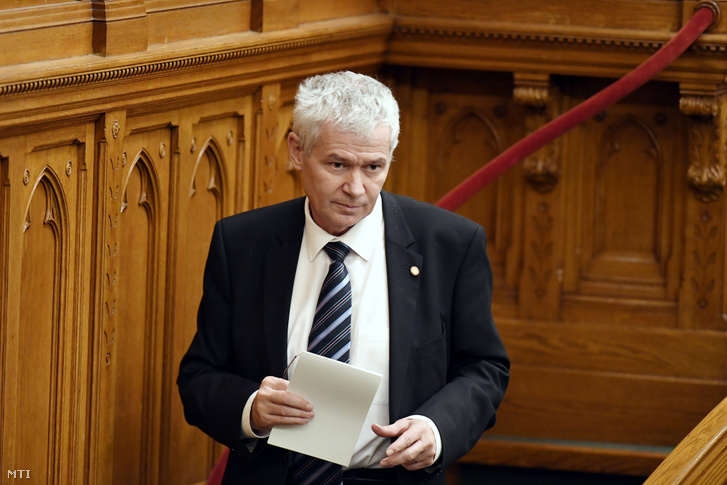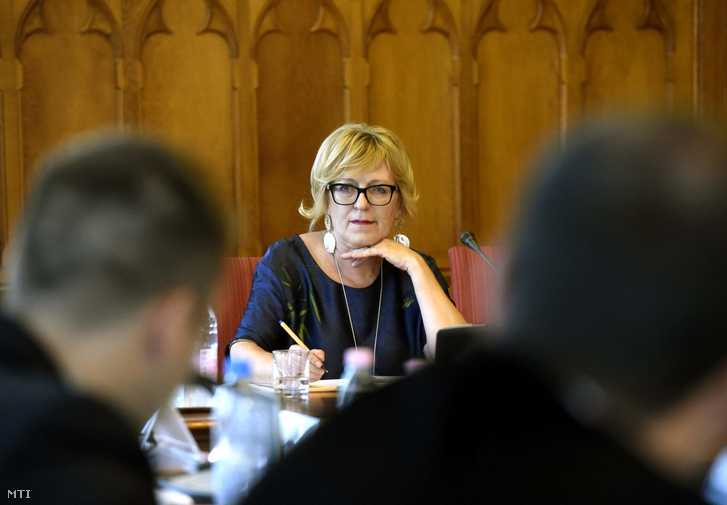Prosecutor General steps in to prevent ECJ from examining judicial independence in Hungary

As we have previously reported, a Hungarian judge requested the preliminary ruling of the European Court of Justice (ECJ) to determine if bad practices of the Hungarian court system affect judicial independence in Hungary. On Tuesday, Péter Polt, the Hungarian Prosecutor General personally filed an appeal against the judge's request. This move could effectively prevent the ECJ from inspecting the anomalies of the Hungarian court system.
Judge Csaba Vasvári suspended a criminal case against a foreign national to request a preliminary ruling from the ECJ as we have reported in July. Vasvári said that a foreign national could theoretically get a criminal conviction overturned at international forums, because if the proper guarantees of judicial independence are not in place, they could rightly claim that the procedure violated their right to a fair trial. To prevent this, Vasvári asked the ECJ to determine if it is compliant with EU regulations that:
- The right of the accused to use their native language is limited by the unavailability of (qualified or otherwise) interpreters;
- Instead of calling applications for an open tender for judicial leadership positions, Tünde Handó, the president of the National Judicial office appoints temporary judiciary leaders without the approval of the National Judicial Council, the highest forum of judicial self-governance;
- Judges make less money than prosecutors and this imbalance is only countered by discretionary bonuses awarded by the abovementioned judicial leaders, and this may jeopardise the integrity of judges as their decisions could be influenced by the discretionarily awarded bonuses.
Prosecutor General: The ECJ has nothing to do with this
But Hungarian Prosecutor General Péter Polt insists that the institution of the ECJ's preliminary rulings can only be used for matters regarding the interpretation of the EU Treaties, and for interpreting and determining the validity of legal acts and decisions of EU organisations. As Polt's appeal states:
"There is no room for requesting a preliminary ruling if the question to be determined by the ECJ concerns whether or not the applicable Hungarian laws are compliant with the fundamental principles protected by Community law. A preliminary ruling procedure also cannot be initiated when the questions raised by the request are not relevant to the pending case and can in no way influence its outcome."

According to the Prosecutor General, the questions of the request had nothing to do with the interpretation of the Treaties and do not concern the ECJ. Based on this,
Prosecutor General Péter Polt requested Hungary's supreme court, the Curia to deem unlawful and annul Vasvári's court order that initiated the ECJ's preliminary ruling procedure.
If the Curia rules in favour of Péter Polt's appeal, the European Court of Justice will not be able to examine the safeguards of judicial independence within the Hungarian judicial administration. The Curia will decide at a public hearing scheduled for next week.
International criticism of Tünde Handó's position
The significance of the preliminary ruling case, that could have made it necessary for Polt to act personally, is that until recently, the Government's main argument for the judicial structure they introduced in 2012 had been that judicial independence is secure as Handó's powers are sufficiently balanced by the self-governing National Judicial Council.
However, this May, the National Judicial Council requested the Parliament to remove Tünde Handó from her presidency of the National Judicial Office, but Fidesz-KDNP's two-thirds majority in the Hungarian Parliament rejected to even examine the complaints about the legality of Handó's leadership practices. Commenting on the Parliament's decision, the National Judicial Council's press release stated:
"This decision justifies the worries voiced in domestic and international forums: Currently, there are no functioning checks or constitutional balances on the powers of the President of the National Judicial Office, therefore, the Hungarian judiciary operates in submission to the legislative power. Tünde Handó can carry out her activities with no effective oversight from within the judicial branch."
The NJC's observations were also confirmed by a number of international organisations. The report from the fact-finding mission of the European Association of Judges assessed that the
"Hungarian judiciary is facing a very grievous situation which in some aspects comes close to a “constitutional crisis” due to the activity of the President of the National Judicial office who denies any collaboration with the National Judicial Council,"
and the President of the Venice Commission and a recommendation of the European Council expressed similar concerns about the position as well.

But the apparent problem with influence the NJO's president has over appointments may be the best explained by GRECO's recently released compliance reports on Hungary: The Council of Europe's anti-corruption organisation noted that the President of the NJO has the discretionary power to declare appointment tenders unsuccessful, thus vetoing otherwise legitimate candidates for leadership positions. In their response to GRECO, the Hungarian Government said that the NJO's President can only exercise that power under certain conditions defined by law, however, as Greco replied, one of these legal conditions for declaring tenders unsuccessful is simply "if the President does not support any of the candidates."
In the report, GRECO maintained that the last word on the appointments should belong to the National Judicial Council, and even though the body of judicial self-governance did gain some more influence over the appointment process in recent times, but still,
"THE INVOLVEMENT OF THE PRESIDENT in this process HAS THE POTENTIAL OF INTRODUCING DISCRETIONARY AND BIASED DECISIONS BY A SINGLE OFFICIAL in THE SELECTION PROCESS"
(Cover: Tünde Handó, the President of the National Judicial Office (left) and Prosecutor General Péter Polt (right) attending a press conference in Budapest on 27 May 2014. Photo: Zsolt Szigetváry / MTI)

Support the independent media!
The English section of Index is financed from donations.


